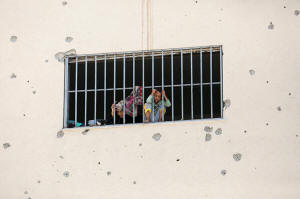Israeli forces advance in southern Gaza, tanks active in Rafah
 Send a link to a friend
Send a link to a friend
 [July 25, 2024]
By Nidal al-Mughrabi [July 25, 2024]
By Nidal al-Mughrabi
CAIRO (Reuters) - Israeli forces advanced deeper into some towns on the
eastern side of Khan Younis in southern Gaza on Thursday, hours after
Israeli Prime Minister Benjamin Netanyahu told U.S. lawmakers he was
actively engaged in bringing hostages home.
Fighting in recent days has centered around the eastern towns of Bani
Suaila, Al-Zanna, and Al-Karara, where the army said on Wednesday it had
found the bodies of five Israelis who were killed in Hamas' Oct. 7
attack on Israel and held in Gaza since.
Hamas militants took more than 250 hostages in the early morning raid
into southern Israel and killed 1,200 people, according to Israeli
tallies.
Israel retaliated by vowing to eradicate Hamas in Gaza in a nine-month
war that has killed more than 39,000 Palestinians, Gaza health officials
say.
Several were wounded in the eastern towns during Israeli tank and aerial
shelling, while an airstrike east of Khan Younis killed four people,
Palestinian health officials said.
Israeli bombardment intensified in several areas in Rafah, near the
border with Egypt, as tanks operated north, west and in the town centre,
residents and medics said. Several Palestinians were also wounded in
Israeli fire earlier on Thursday.

The Israeli military said forces operating in Khan Younis killed dozens
of militants and dismantled around 50 military infrastructures, while it
continued activities in Rafah, killing two militants.
In a speech to the U.S. Congress, Netanyahu said his government was
actively involved in seeking the release of remaining hostages and was
confident they would succeed.
DISAPPOINTING SPEECH
Hamas described the comments by Netanyahu as "pure lies" accusing him of
thwarting efforts to end the war.
Netanyahu's comments also disappointed many displaced Palestinians who
had hoped for a clearer signal of an imminent end to the fighting, which
has laid the overcrowded enclave to waste and created a humanitarian
crisis.
[to top of second column]
|

Displaced Palestinians, who fled their houses due to Israeli
strikes, look out from a window as they take shelter, amid the
ongoing conflict between Israel and Hamas, in Khan Younis in the
southern Gaza Strip, July 24, 2024. REUTERS/Hatem Khaled

"It was depressing, he didn't even mention ceasefire at all, not
even once," said Tamer Al-Burai, a resident of Gaza City, now
displaced in Deir Al-Balah in the central Gaza Strip.
"People awaited some surprise, a ceasefire announcement by Netanyahu
as a gift to (U.S. President Joe) Biden, but they slept with much
disappointment, as Netanyahu said he was determined to pursue war,"
Burai told Reuters via a chat app.
Deir Al-Balah, where tanks haven't yet invaded, is currently
overcrowded with hundreds of thousands of Palestinians, displaced
from other areas of the enclave, home to 2.3 million people.
"Netanyahu spoke in a play, he spoke to clowns," said Burai.
Diplomatic efforts by Arab mediators, backed by the United States,
to conclude a ceasefire deal, seemed to be on hold, as Israel was
expected to send a delegation for more talks next week.
In northern Gaza, an Israeli air strike on a house in the Sheikh
Radwan suburb killed four people, medics said, while seven
Palestinians arrived at a hospital in central Gaza who had been
detained by Israeli forces and released in an area close to the
border.
(Reporting by Nidal al-Mughrabi. Additional reporting by Ali Sawafta
in Ramallah; Editing by Sharon Singleton)
[© 2024 Thomson Reuters. All rights
reserved.]This material
may not be published, broadcast, rewritten or redistributed.
Thompson Reuters is solely responsible for this content.
 |